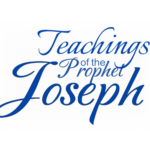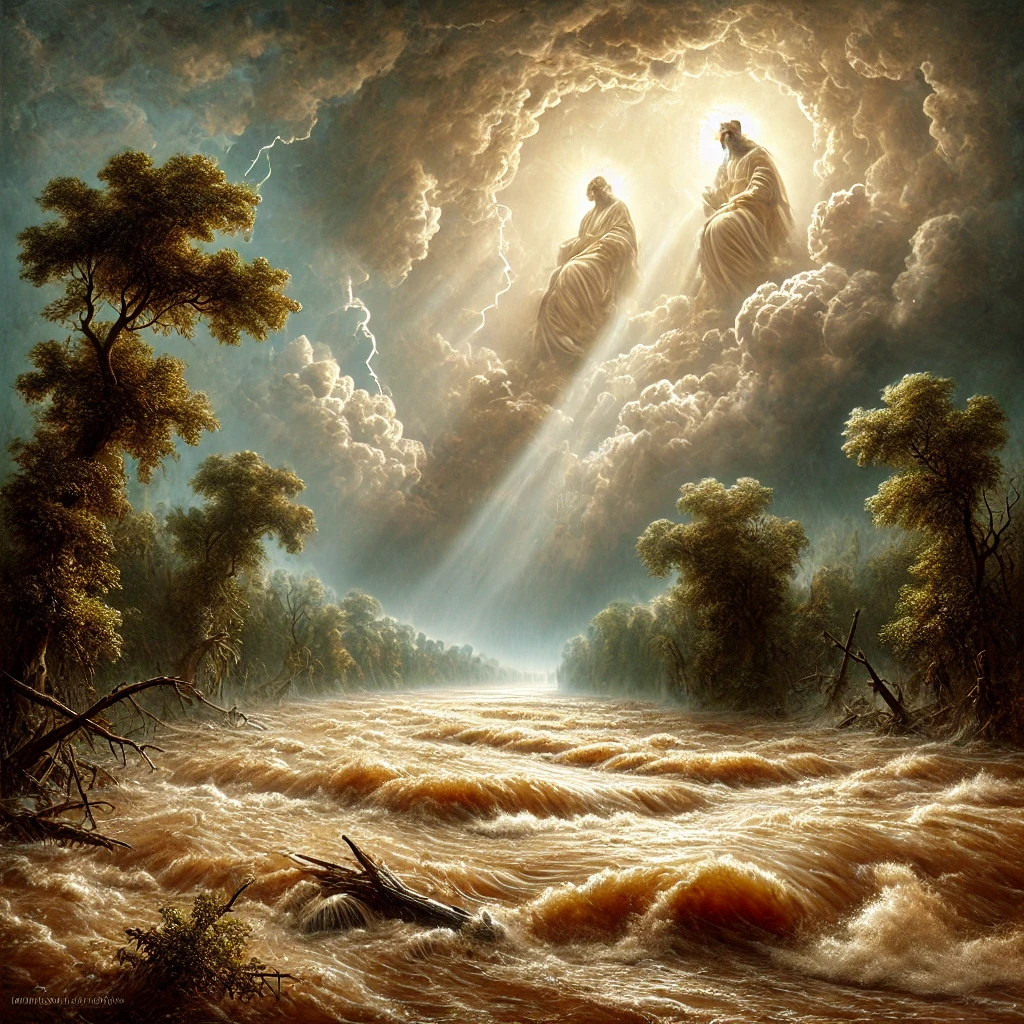Philo Dibble
I was in Clay County, Missouri, when Zion’s camp came up. I met them on Fishing River. There the power of the Lord was manifested by His sending a thunder storm, which raised Fishing River ten feet higher than it was ever known to rise before. I saw the cloud coming up in the west when I was ten miles from Fishing River in the middle of the afternoon. As it moved on eastwardly at increased in size and in blackness, and when it got over the camp it stopped. In the night, the rain and hail poured down in torrents, and the lightning flashed from the cloud continuously for three hours.
Just before night, two men came into camp and asked where Mr. Smith was. Joseph said, “I am the man.” They then advised him to disband his camp, “for,” said they, “the mobs are gathering, and there won’t be one of you left tomorrow morning!”
Joseph smiled, and said, “I guess not.”
Seeing that Joseph did not believe what they came to tell him, they went off vexed.
We learned afterwards that the hail was so heavy on the mob that they were forced to seek shelter, and the leader of them swore he would never go against the “Mormons” again. 3 Philo Dibble, The Juvenile Instructor, XXVII, (January 1, 1892), pp. 22-23; (May 15, 1892), pp. 303-304; (June 1, 1892), p. 345; Early Scenes in Church History (Faith Promoting Series, volume 8) (Salt Lake City, 1882), pp. 79-96; Hyrum L. Andrus and Helen Mae Andrus, comps., They Knew the Prophet [Salt Lake City: Bookcraft, 1974], 70.
Church History in the Fulness of Times Institute Manual
By 18 June, Zion’s Camp arrived within a mile of Richmond, the county seat of Ray County. As the army encamped, the Prophet had a premonition of danger. He went into the woods and prayed for safety, and he was assured that the Lord would protect them. He had the camp roused in the early morning hours, and they left without prayers or breakfast. As they marched through Richmond, a black slave woman agitatedly told Luke Johnson, “There is a company of men lying in wait here, who are calculating to kill you this morning as you pass through.” They met no resistance, although they were able to make only nine miles, being slowed down by broken wagon wheels.
Instead of reaching their intended destination of Liberty, they camped just inside Clay County on a hill between two branches of the Fishing River. When Joseph learned that mobs were preparing to attack, he knelt and prayed again for divine protection. Joseph’s fears were confirmed when five armed Missourians rode into camp, cursing, and swore that the Mormons would “see hell before morning.” They boasted that nearly four hundred men had joined forces from Ray, Lafayette, Clay, and Jackson counties and were then preparing to cross the Missouri River at Williams Ferry and “utterly destroy the Mormons.” Sounds of gunfire were heard, and some of the men wanted to fight, but the Prophet promised that the Lord would protect them. He declared, “Stand still and see the salvation of God.”
A few minutes after the Missourians left, a small black cloud appeared in the clear western sky. It moved eastward, unrolling like a scroll, filling the heavens with darkness. As the first ferry load of mobbers crossed the Missouri River to the south, a sudden squall [storm] made it nearly impossible for the boat to return to pick up another load. The storm was so intense that Zion’s Camp abandoned their tents and found shelter in an old Baptist meetinghouse nearby. When Joseph Smith came in, he exclaimed, “Boys, there is some meaning to this. God is in this storm.” It was impossible for anyone to sleep, so the group sang hymns and rested on the rough benches. One camp member recorded that “during this time the whole canopy of the wide horizen was in one complete blaze with terrifying claps of thunder.”
Elsewhere the beleaguered mobbers sought any refuge they could. The furious storm broke branches from trees and destroyed crops. It soaked and made the mobbers’ ammunition useless, frightened and scattered their horses, and raised the level of the Fishing River [40 feet], preventing them from attacking Zion’s Camp. The Prophet recalled, “It seemed as if the mandate of vengeance had gone forth from the God of battles, to protect His servants from the destruction of their enemies.”
Two days later, on 21 June, Colonel John Sconce and two associates of the Ray County militia rode into Zion’s Camp to learn of the Mormons’ intentions. “I see that there is an Almighty power that protects this people,” Sconce admitted. The Prophet explained that the only purpose of Zion’s Camp was to help their brethren be reinstated on their lands and that their intent was not to injure anyone. He said, “The evil reports circulated about us were false, and got up by our enemies to procure our destruction.” Sconce and his companions were so affected by the stories of the unjust trials and suffering of the Saints that they promised to use their influence to offset feelings against the Mormons. 4
Church History in the Fulness of Times, p. 148.

